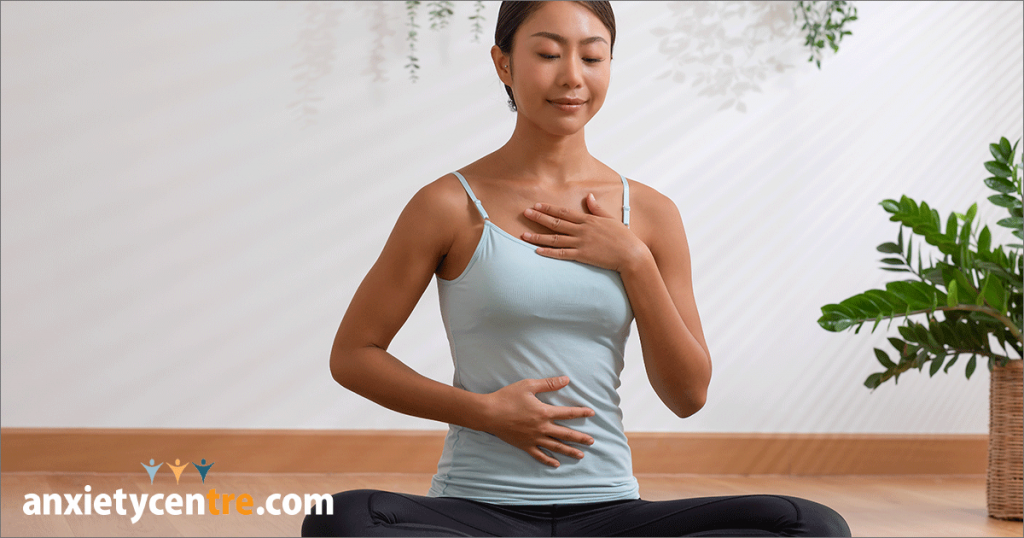
A team of researchers at Stanford University found cyclic breathing – exhaling longer than inhaling – more effectively reduces stress than mindfulness meditation – relaxing by focusing in the moment and nonjudgmentally.[1]
The researchers concluded this during their study of several different stress reduction techniques in their paper published in the journal Cell Reports Medicine.
While previous research has shown two sides to stress – positive and negative – chronic stress has been linked to many negative impacts on health. Therefore, emphasis has been placed on healthy stress management strategies like breathing and deep relaxation, such as mindfulness meditation.
However, Stanford University researchers wanted to determine if some stress reduction strategies were more effective than others.
The study’s summary states:
“Controlled breathwork practices have emerged as potential tools for stress management and well-being. Here, we report a remote, randomized, controlled study (NCT05304000) of three different daily 5-min breathwork exercises compared with an equivalent period of mindfulness meditation over 1 month. The breathing conditions are (1) cyclic sighing, which emphasizes prolonged exhalations; (2) box breathing, which is equal duration of inhalations, breath retentions, and exhalations; and (3) cyclic hyperventilation with retention, with longer inhalations and shorter exhalations. The primary endpoints are improvement in mood and anxiety as well as reduced physiological arousal (respiratory rate, heart rate, and heart rate variability). Using a mixed-effects model, we show that breathwork, especially the exhale-focused cyclic sighing, produces greater improvement in mood (p < 0.05) and reduction in respiratory rate (p < 0.05) compared with mindfulness meditation. Daily 5-min cyclic sighing has promise as an effective stress management exercise.”
---------- Advertisement - Article Continues Below ----------
---------- Advertisement Ends ----------
The study further notes:
“While all four groups showed significant daily improvement in positive affect and reduction in state anxiety and negative affect, there were significant differences between mindfulness meditation and breathwork in positive affect.”
We’ve always been proponents of regular deep relaxation combined with relaxed diaphragmatic breathing. This study shows the effectiveness of breathing as part of healthy stress management, especially cyclic breathing.
The study also notes the important link between anxiety and breathing:
“Controlled breathing can also directly influence the cortical structures regulating emotion and mood and arousal. Breathlessness and anticipation of breathlessness are both perceived as threatening and activate the limbic structures involved in emotion generation while inactivating cortical structures involved in emotional regulation such as the prefrontal cortex.51,52,53 People with high anxiety and panic disorder have less tolerance for breathlessness and have heightened activity in the anterior insula, a region central to interoception of visceral signals and central to the salience network.42,54 Thus, controlled breathing can potentially act in the opposite way and reduce anxiety by decreasing anterior insula activity.”
We recommend daily deep relaxation combined with breathwork if you are struggling with anxiety and hyperstimulation. And for the most effective results, try cycling breathing and see how the combination works for you.
If you have difficulty managing your anxiety, stress, and symptoms, we also recommend connecting with one of our recommended anxiety disorder therapists to help you address both levels of anxiety disorder recovery (Level One and Level Two recovery) and learn and apply deep relaxation and breathwork into your regular stress management practice.
There are many natural and practical ways to reduce and eliminate unhealthy anxiety and stress. Regular deep relaxation and breathwork are tried and proven examples.
---------- Advertisement - Article Continues Below ----------
---------- Advertisement Ends ----------
Reference
- Balban, Melis Yilmaz, et al. “Brief structured respiration practices enhance mood and reduce physiological arousal.” Cell Reports Medicine, 17 January 2023.
Common Anxiety Symptoms
Additional Resources
- For a comprehensive list of Anxiety Disorders Symptoms Signs, Types, Causes, Diagnosis, and Treatment.
- Anxiety and panic attacks symptoms can be powerful experiences. Find out what they are and how to stop them.
- How to stop an anxiety attack and panic.
- Free online anxiety tests to screen for anxiety. Two minute tests with instant results. Such as:
- Anxiety 101 is a summarized description of anxiety, anxiety disorder, and how to overcome it.
